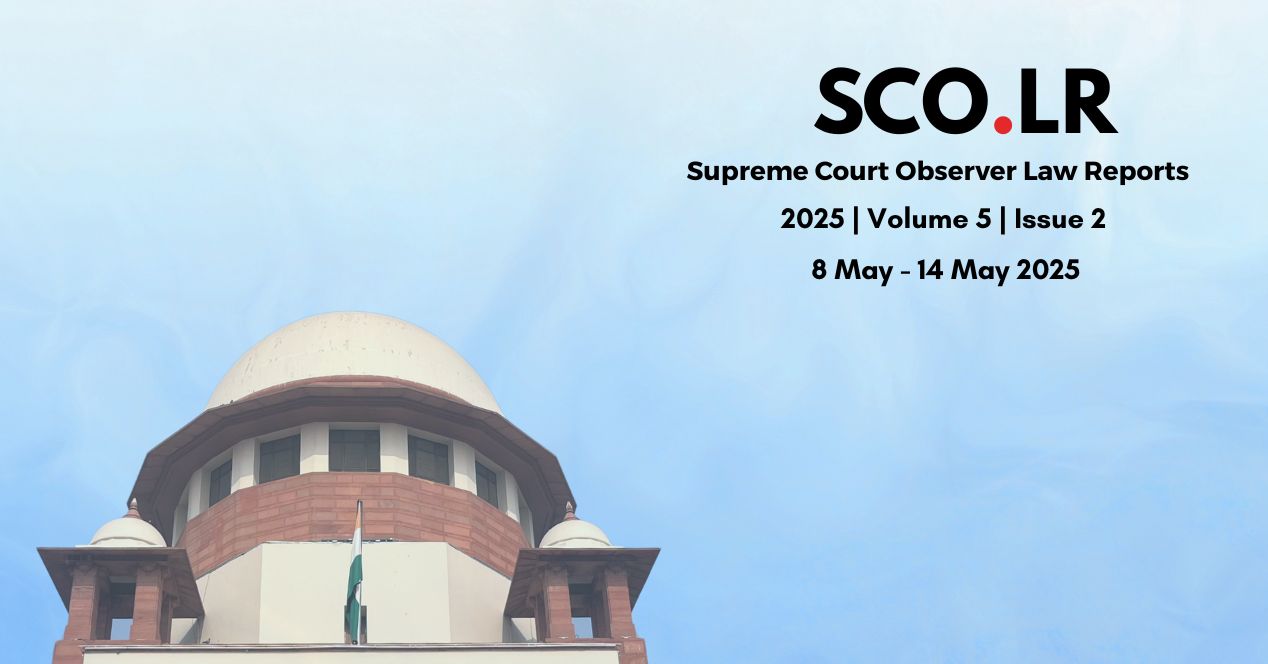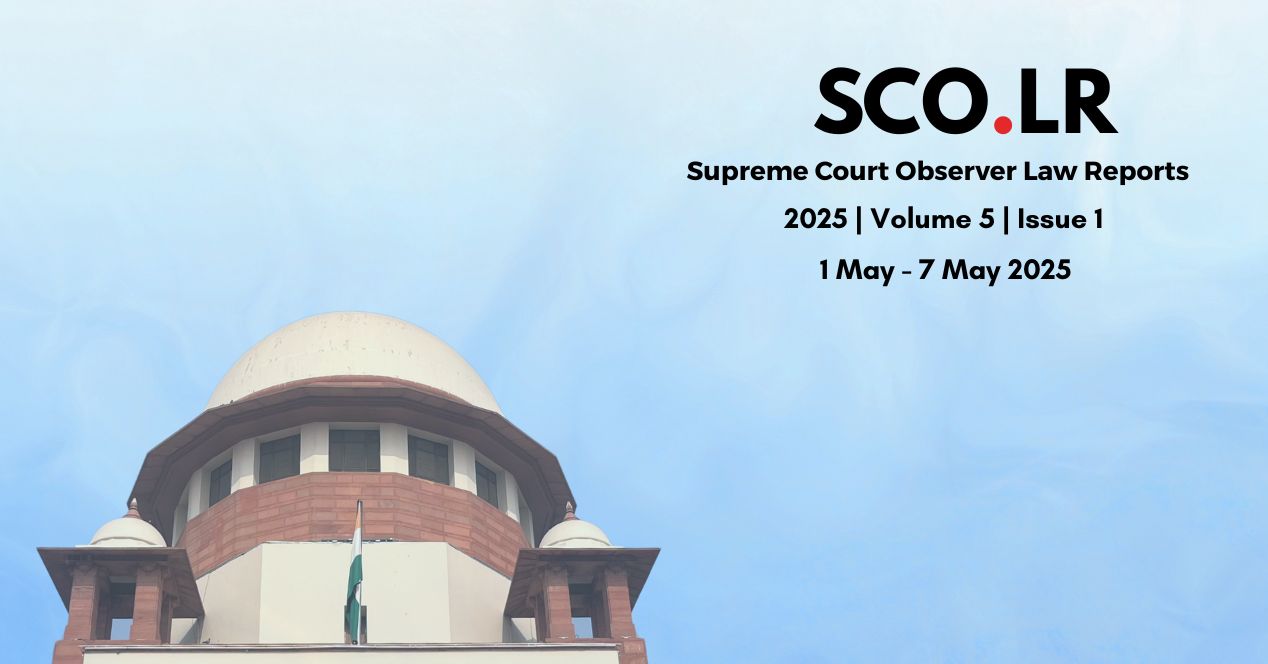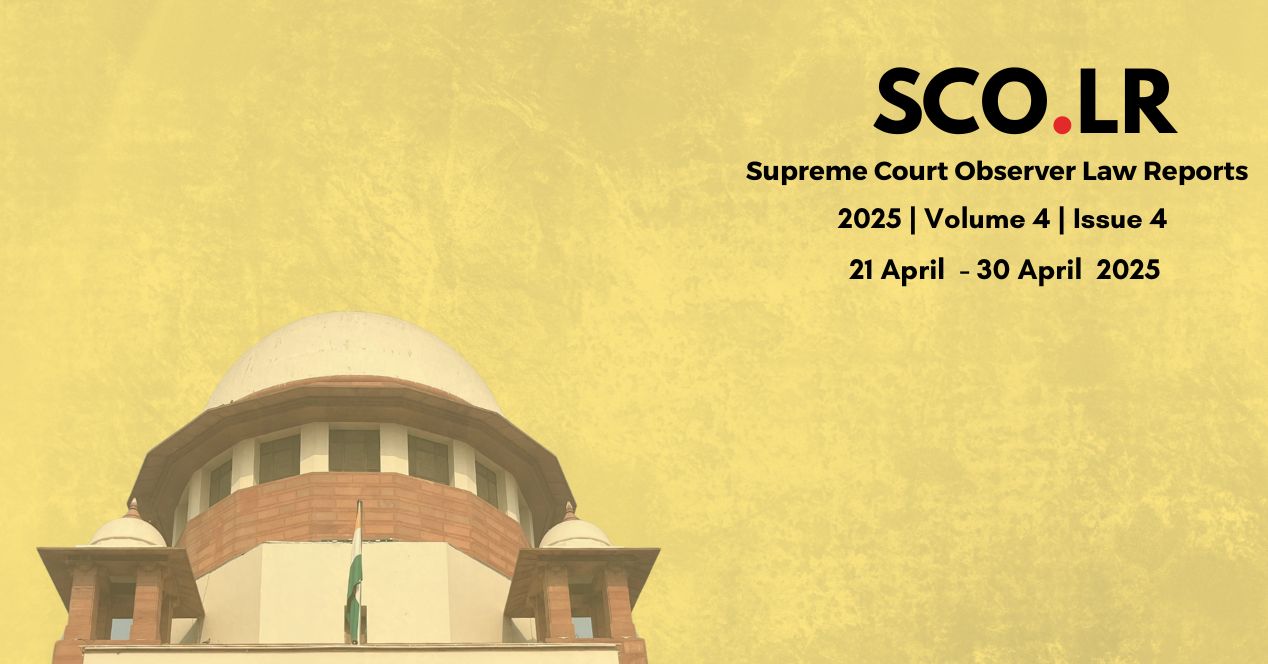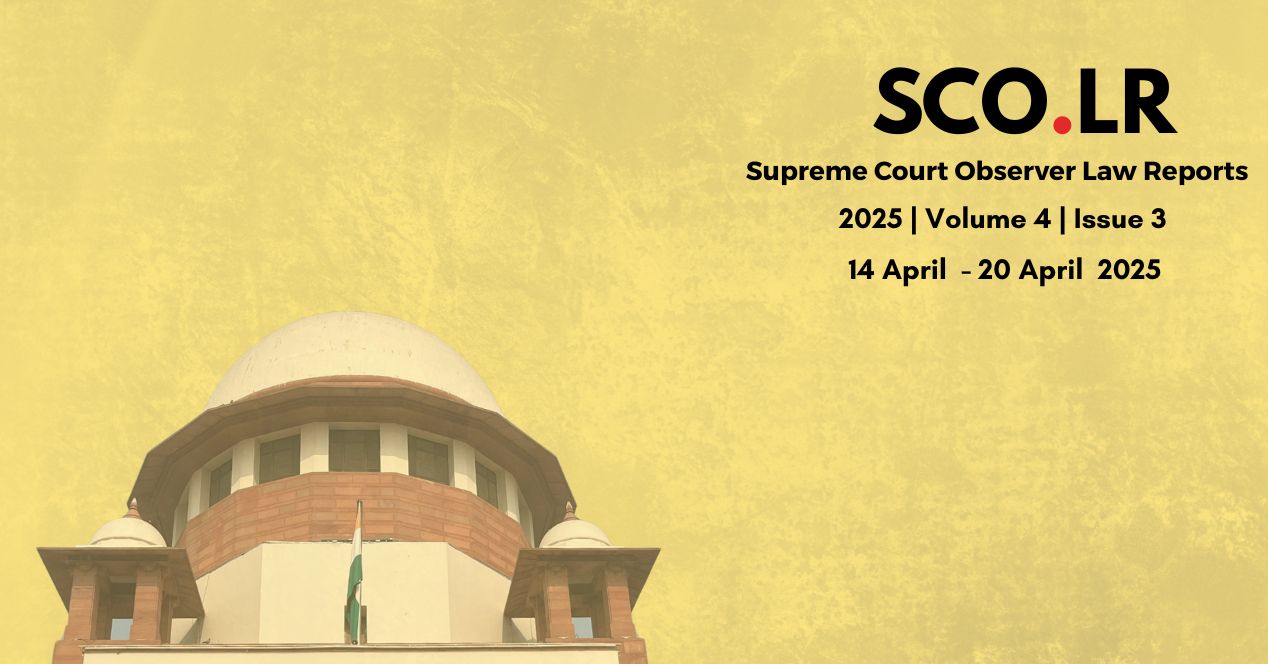Analysis
SCO.LR | 2025 | Volume 5 | Issue 3
In this Issue of SCO.LR, we summarise five significant and unmissable judgements from 15 May to 21 May 2025
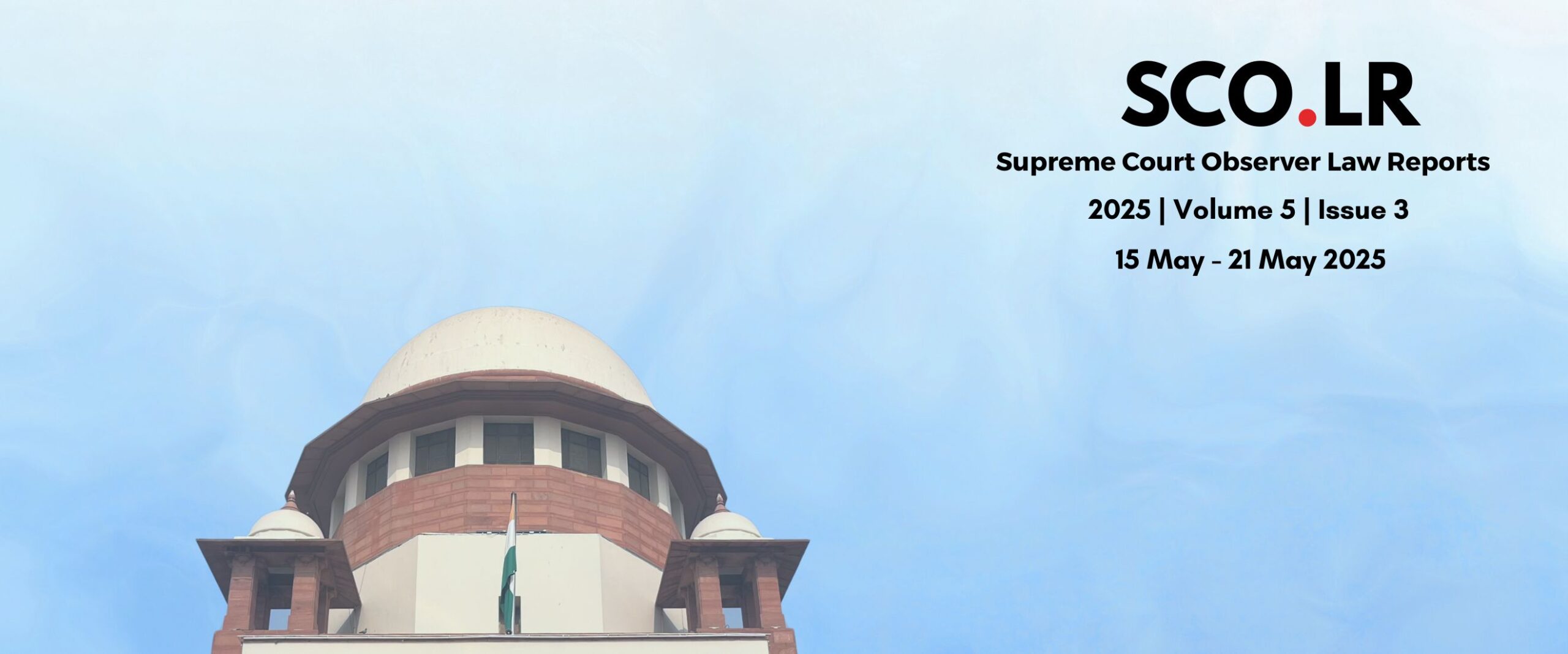
Today, we are pleased to introduce the Supreme Court Observer Law Reports (SCO.LR) landing page—a new space on our website where you can easily access structured summaries of five key Supreme Court judgements each week.
This week, we bring you Judgements from 15 to 21 May 2025.
On our new page, each Judgement is presented in a reader-friendly HTML format. You can now filter Judgements by year, volume and issue for easy access. Check out our page now here!
The Supreme Court Observer Law Reports
2025 SCO.LR | Vol 5 | Issue 3
15 May – 21 May 2025
**********
Transfer of Probe to Independent Agency When There Is Custodial Death
Hansura Bai v State of Madhya Pradesh
15 May 2025
Citations: 2025 INSC 711 | 2025 SCO.LR 5(3)[11]
Bench: Justices Vikram Nath and Sandeep Mehta
The Supreme Court emphasised the need for an impartial investigating agency in cases involving custodial deaths, citing the principle of ‘nemo judex in causa sua’ (‘no one should be a judge in his own cause’).
25-year old Deva Pardhi was taken into custody along with his uncle Gangaram Pardhi in connection with a theft investigation. Both were reportedly subjected to “intense third-degree treatment” and were brutally tortured to force a confession. Deva died in custody. A Single Judge of the Madhya Pradesh High Court refused to transfer the investigation to the CBI and denied bail to Gangaram.
Finding that the local police investigation was not “transparent,” the Supreme Court directed the transfer of the investigation to the CBI. It also ordered the arrest of the responsible police officers within a month and completion of the investigation within 90 days. The Court also expressed concern over the safety of Gangaram as the sole eyewitness of the alleged torture, granted him liberty to apply for bail directly in the Madhya Pradesh High Court, and directed the State to provide him with witness protection.
Key words/phrases: Custodial Death—transfer of investigation—witness protection—CBI—police brutality—nemo judex in causa sua
Read the Judgement here.
Mind map**********
MPID Act Overrides Priority of Interest by Secured Creditors
National Spot Exchange Ltd v Union of India
15 May 2025
Citations: 2025 INSC 694 | 2025 SCO.LR 5(3)[12]
Bench: Justices Bela Trivedi and S.C. Sharma
The Supreme Court prioritized the interests of depositors under the Maharashtra Protection of Investors and Depositors (MPID) Act. The Court further clarified the treatment of attached assets in relation to moratoriums under the Insolvency and Bankruptcy Code (IBC), which halt legal proceedings.
National Spot Exchange Ltd (NSEL), an electronic trading platform, was accused of payment default and fraud worth ₹5,600 crores. To repay the affected depositors, NSEL’s assets were attached under the MPID and Prevention of Money Laundering (PMLA) Acts. The Supreme Court established a committee to oversee the recovery and distribution of funds. The Committee’s decisions on the priority of claims and the treatment of assets under different legislations were appealed.
The Supreme Court upheld the Committee’s orders and ruled that assets deemed to be “proceeds of crime” under PMLA or attached under the MPID Act to protect depositors’ interests take priority over the claims of secured creditors. The Court found no inconsistency between the provisions of MPID Act and the IBC, and ruled that properties attached under the MPID before an IBC moratorium is imposed can be sold to recover money owed.
Key words/phrases: NSEL Scam—Maharashtra Protection of Investors and Depositors (MPID) Act—Secured Creditors—Priority Claim—Prevention of Money Laundering Act (PMLA)—overriding effect—Insolvency and Bankruptcy Code (IBC)
Read the Judgement here.
Mind map**********
Executive Cannot Impose Financial Levies Without Proper Legislation
State of Kerala v Principal, KMCT Medical College
16 May 2025
Citations: 2025 INSC 518 | 2025 SCO.LR 5(3)[13]
Bench: Justices Surya Kant and N.K. Singh
The Supreme Court upheld the Kerala High Court’s quashing of a state order mandating the creation of a fee corpus from NRIs to subsidise fees for Below Poverty Line (BPL) students.
Kerala’s Admission and Fee Regulatory Committee directed self-financing medical colleges to create a corpus fund for BPL students by collecting ₹5 lakh from each NRI student annually. This was backed by a state government order. KMCT Medical College challenged the directive in the High Court. The High Court struck down the order but directed that the collected funds remain with the colleges for the benefit of economically weaker students.
On appeal, the Supreme Court ruled that the executive cannot impose levies or require a corpus fund without a suitable state legislation. The Court found that the Committee under the Kerala Medical Education Act, 2017, can regulate non-exploitative fees but lacks the power to mandate corpus funds or divert fees to the state without an explicit legal provision. The Court further directed that while self-financing medical colleges may retain funds collected as fees from NRIs, they must use them to substantially subsidise BPL students.
Keywords/phrases: Kerala High Court—NRI-fee corpus fund—subsidise BPL students—legal authority required—Kerala Medical Education Act, 2017—executive power limits—autonomy of institutions
Read the Judgement here.
Mind map**********
‘One Rank, One Pension’ to be Implemented for Retired High Court Judges
In Re Refixation of Pension Considering Service Period in District Judiciary and High Court
19 May 2025
Citations: 2025 INSC 726 | 2025 SCO.LR 5(3)[14]
Bench: Chief Justice B.R. Gavai, Justices A.G. Masih and K.V. Chandran
The Supreme Court held that the “One Rank, One Pension” principle should be implemented for providing retirement benefits to High Courts judges, irrespective of their role as additional or permanent judge.
The Court was considering the exclusion of district judiciary stints and breaks during transitions in the calculation of time period for pension payments. It examined whether judges appointed during the New Pension Scheme (NPS) and those who served as additional judges could be denied full or family pension. It also looked into whether Provident Fund benefits could be withheld under the High Court Judges (Salaries and Conditions of Service) Act, 1954 (HCJ Act).
The Court held that the OROP principle should apply to all judges, irrespective of whether they were elevated from the Bar or the district judiciary. The full pension should be provided to retired judges regardless of any break in service; the same goes for judges who joined the district judiciary after the NPS scheme came into force; family pension should be provided irrespective of whether the judges were additional or permanent; gratuity to the widow or family members should be paid by adding 10 years to the service provided by the judge; all allowances under the HCJ Act to be paid on retirement including leave encashment, Provident Fund and commutation of pensions.
Key words/phrases: One rank one pension—retired judges of High Courts—family pension to widow or family members of High Court judges—retirement benefits—leave encashment—commutation of pensions—provident fund—High Court Judges (Salaries and Conditions of Service) Act, 1954
Read the Judgement here
Mind map**********
Three Years of Practice Must for Civil Judge (Junior Division) Eligibility
All India Judges Association v Union of India
20 May 2025
Citations: 2025 INSC 735 | 2025 SCO.LR 5(3)[15]
Bench: Chief Justice B.R. Gavai, Justices A.G. Masih, K.V. Chandran
The Supreme Court held that candidates seeking to become a Civil Judge (Junior Division) must have practised as an advocate or law clerk for at least three years. The decision overruled the Court’s own Judgement from 2002.
After the 2002 Judgement, interested parties approached the Court seeking relief concerning qualification, promotion and selection in the Judicial Services. During these hearings, the Court “found it necessary to decide certain larger issues concerning the administration of justice,” which included the question of whether law graduates could be appointed as judges without practice experience.
The Court reinstated the rule that required three years of practice to become eligible to appear for the post of Civil Judge (Junior Division). The Court also issued reservation-related directions for in-service judicial officers to avail fast-tracked promotions: (a) it introduced 10 percent reservation for the post of Civil Judge (Senior Division); (b) it increased the quota of reserved seats from 10 percent to 25 percent for posts in the Higher Judiciary. To avail these promotions, candidates appear for the Limited Departmental Competitive Examinations (LDCE).
Key words/phrases: Eligibility to become a civil judge—mandatory three-year practice—2002 judgement on judge exams—quota within junior civil judges for promotion—25 percent reservation for candidates clearing Limited Departmental Competitive Examinations—LDCE
Read the Judgement here.
Mind map**********
This Issue of SCO.LR was put together by Advay Vora, Ajitesh Singh, Raaz and Gauri Kashyap

